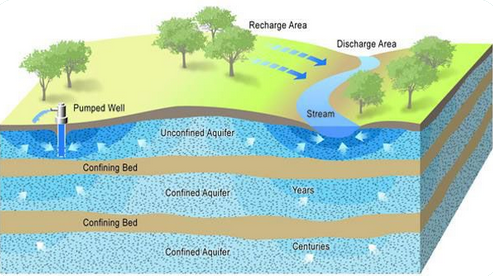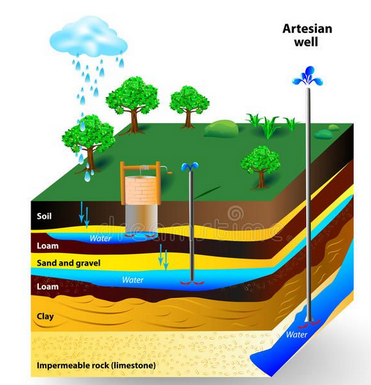
unheard
Advanced Member-
Posts
1,244 -
Joined
-
Last visited
Content Type
Events
Forums
Downloads
Quizzes
Gallery
Blogs
Everything posted by unheard
-
Trial and error of building a cheap house in Isaan
unheard replied to lost in isaan's topic in DIY Forum
I don't know if you have noticed but my "faulty assumptions" are directly quoted from a governmental website. As I have said, it can takes centuries for surface water to get filtered through multiple geological layers as is the case with deep aquifers. In addition, as I've already mentioned, it's highly recommended to test water to rule out potential contamination. There should be no guessing involved. Every well is different and produces varies output and quality of water. Deep bore well drilling (50m and deeper) is relatively cheap and common in many areas of Thailand, but not in all. But again, why to generalize? Many areas have soft, rock free soils where even the simplest of a rig is capable of quickly getting past the 50m mark. Yet there are many other areas in mostly mountainous regions where only much more specialized and very expensive rigs, equipped with very powerful air compressors and repercussion type of drill bits that make it possible to hammer through rocky geology. -
Done on every newly built house in Thailand (as far as I know). Well, maybe not the ones built by farmers.
-
Trial and error of building a cheap house in Isaan
unheard replied to lost in isaan's topic in DIY Forum
"While useful for many things, rainwater is not as pure as you might think, so you cannot assume it is safe to drink. Rain can wash different types of contaminants into the water you collect (for example, bird poop on your roof could end up in your water barrel or tank). Rainwater can carry bacteria, parasites, viruses, and chemicals that could make you sick, and it has been linked to disease outbreaks." https://www.cdc.gov/healthywater/drinking/private/rainwater-collection.html Regarding well water. In my prior post I've specifically mentioned the importance of well's depth. Local geology also plays a huge role. Shallow wells are likely to be contaminated by surface water and all contaminants that you've listed above. Deep aquifers are far less likely to contain bacteria, nitrates and pesticides compared to rain water collected from roofs or gutters or well water pumped out shallow aquifers. It takes many years or even centuries for surface water to filter through multiple geological layers. -
Sure, he could have a special case which did require (or rather allowed) piles. But he hasn't mentioned anything specific, not even if his lot's been surveyed and found to be suitable for the uncommon to the area measure (piles). His words: "I dont understand why builders just dont just use piers its simple and quick" Every builder in Thailand (or anywhere else) wouldn't hesitate to use "simple and quick" methods over the more complex and slower solutions if they were to satisfy local building requirements. Since simpler and quicker usually translates into cheaper. He also said: "I used an architect that worked for the local authority he did the plans". Still, not a direct answer to my question if the house plan has been permitted or not. Just because it's been drawn by an architect that has supposedly worked for the local authority could mean many things.
-
Trial and error of building a cheap house in Isaan
unheard replied to lost in isaan's topic in DIY Forum
Your well water might turn out to be safe to drink. And might even be a safer option over your local drinking water purifying plant with unknown levels of quality consistency (in water purification and bottle disinfection). -
I'm not a structural engineer... But his pile-based foundation just doesn't look right, especially on a large house. As you've said, there's no shortage of construction equipment in Chiang Mai. Therefore it can not be used as a reason for not seeing any other similar type of foundations being constructed in the area.
-
Trial and error of building a cheap house in Isaan
unheard replied to lost in isaan's topic in DIY Forum
@lost in isaan "Not sure why they installed panels and didn't just fill the holes with concrete? To save money?" I don't understand what you meant by that. "Both the well water and rainwater will be filtered to ensure their purity. I'm still open to ideas and nothing is set in concrete." To what standard do you want to purify your water? Do you plan to drink it? The first thing to do is to test your well water in a lab. If it's of a good quality then you could safely use cheaper filters to bring it up to a drinking purity standard. You could also use a more expensive Reverse Osmosis system that would almost always guarantee your drinking water safety unless your water is super bad. IMO, rain water is almost always inferior to a deep bore well water due to prevalent atmospheric/collecting surface bacteria contaminants, seasonal availability and problems related to storing it without making it even more contaminated with pathogens. On the other hand, deep well water is available on demand, sourced from the virtually bacteria-free environment and doesn't need to be stored. "A 33-meter hole was drilled on the corner of the elevated land. The driller discovered multiple waterlines in the area, but fortunately none of them were located directly under the house. Water was already found at a depth of 10 meters. I installed the hitachi pump that pumps the water from ~27m. As you can see i also installed the consumer unit and water tank for the builders to use." Not sure if 33m is deep enough to obtain bacteria/contaminant free water which is also free of surface contamination. But it all depends on your local geology. Make sure that the well bore is properly sealed. Also make sure to test your well water before making any assumptions about its quality: https://www.testtech.co.th/th -
Trial and error of building a cheap house in Isaan
unheard replied to lost in isaan's topic in DIY Forum
That's a typical Thai way. They often do that even on high end builds. While not done to perfection, there's nothing of a concern regarding structural rigidity. -
That's the most unusual setup! ???? Is the equipment Thai sourced?
-
Maybe in his particular spot.. I've had a chance to observe a few construction sites in the Chiang Mai vicinity and every single one of them used the common wide footing pads design for columns. Like the ones in the picture I've just posted. That's the reason for my question if his design has been permitted by the local authority.
-
How about the adjacent driveway? The same thickness as the carport slab?
-
What's the proper soil surface preparation process prior to pouring concrete? Is the compacted or loose sand layer strictly necessary?
-
That's unfortunate. Was the PU insulation option available at the time? I've never heard of Bluescope coated metal changing color. That's undeserved generalization. Maybe the low quality coating of cheaper brands does.
-
Exactly, the thicker the better. Even the 25mm option still works wonders.
-
Yeah, but piles are not used in rocky soils, regardless of proximity to other dwellings.
-
I'm not here to argue with you. Let's just move on...
-
Not only BlueScope-franchised stores. Lots of roll forming shops in Thailand have the PU application machines. They will apply that insulation to any coated roofing metal they have in stock, including Bluescope. And yes, PU insulation is normally offered in different thicknesses, starting with 25mm.
-
On the contrary, it makes a lot of sense. On a sunny day a metal roof without insulation will be re-radiating lots of infrared energy, in-directly heating up everything parked underneath.
-
Actually from what I've seen, builders normally create much wider footing pads to distribute the house's weight. Especially for the multiple story houses.
-
Is there a solid rock layer (bedrock) that comes close to the surface? Was your house plan permitted?
-
What is the usage plan for collected water?
-
There's a much better option over the glued-on very thin silvery material. It comes in the form of the 25mm PU insulating layer, which is also applied by the roll-forming shop during the roof sheet production. PU insulation has different properties and applied without any additional gluing agent, therefore it doesn't fall off and has much, much better insulating qualities.
-
DOS Bio Clean or WAVE Bio Seed
-
@MJCM Have you run a test of your well water?
-
@Batty "Im not expecting anyone to give me an actual specific model (unless you want to) but rather just a heads up on what it is I need to be looking for." It largely depends on the quality of your water source. It's usually recommended to get a Reverse Osmosis system (RO). RO systems remove pretty much all impurities. With RO you have two options - a cheaper one with a tank and a more expensive one without. The more advanced tank-less systems work in "real time" - they don't need to use storage tanks (which need to be periodically sanitized) to store filtered water, have higher output, normally monitor the quality of filtered water and use filter replacement alerts based on the filter's actual usage. https://shopee.co.th/YOMIZU-รุ่น-Kiyo-ii-เครื่องกรองน้ำ-RO-Tankless-Real-time-<deleted>-monitor-i.269977134.12225835321?sp_atk=a9368f10-a725-4ea4-939a-f894305c93cd&xptdk=a9368f10-a725-4ea4-939a-f894305c93cd https://shopee.co.th/เครื่องกรองน้ำ-Xiaomi-Water-Purifier-600G-รุ่น-MR624-เครื่องกรองน้ำอัจฉริยะ-สามารถกรองน้ำได้อย่างมีคุณภาพ-i.389579344.8332978690?sp_atk=98619b4b-db8d-44f6-b9f3-ca88308bbdd6&xptdk=98619b4b-db8d-44f6-b9f3-ca88308bbdd6 https://shopee.co.th/เครื่องกรองน้ำPhilips-Water-AUT2015-ดีไซน์หัวก็อกแบบคู่-ระบบกรอง-2-โหมด-สำหรับน้ำบริสุทธิ์และกรองดื่มได้-i.41904241.20443256989?sp_atk=f78340e5-e4cb-475e-ad0a-523764f01bc8&xptdk=f78340e5-e4cb-475e-ad0a-523764f01bc8






